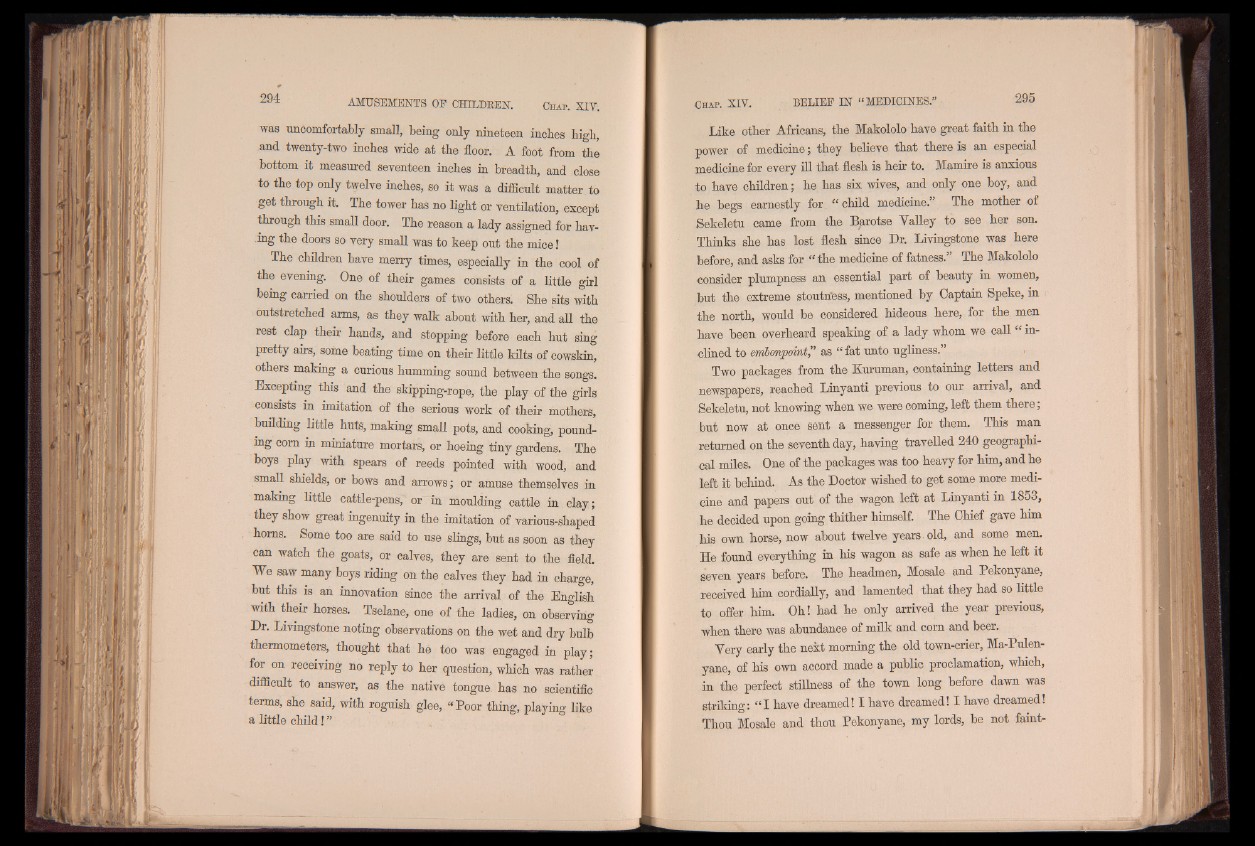
was uncomfortably small, being only nineteen inches high,
and twenty-two inches wide at the floor. A foot from the
bottom it measured seventeen inches in breadth, and close
to the top only twelve inches, so it was a difficult matter to
get through it. The tower has no light or ventilation, except
through this small door. The reason a lady assigned for having
the doors so very small was to keep out the mice!
The children have merry times, especially in the cool of
the evening. One of their games consists of a little girl
being carried on the shoulders of two others. She sits with
outstretched arms, as they walk about with her, and all the
rest clap their hands, and stopping before each hut sing
pretty airs, some beating time on their little kilts of cowskin,
others making a curious humming sound between the songs.
Excepting this and the skipping-rope, the play of the girls
consists in imitation of the serious work of their mothers,
building little huts, making small pots, and cooking, pounding
com in miniature mortars, or hoeing tiny gardens. The
boys play with spears of reeds pointed with wood, and
small shields, or bows and arrows; or amuse themselves in
making little cattle-pens, or in moulding cattle in clay;
they show great ingenuity in the imitation of various-shaped
horns. Some too are said to use slings, but as soon as they
can watch the goats, or calves, they are sent to the field.
We saw many boys riding on the calves they had in charge,
but this is an innovation since the arrival of the EngKaL
with their horses. Tselane, one of the ladies, on observing
Dr. Livingstone noting observations on the wet and dry bulb
thermometers, thought that he too was engaged in play;
for on receiving no reply to her question, which was rather
difficult to answer, as the native tongue, has no scientific
terms, she said, with roguish glee, “ Poor thing, playing like
a little child! ”
Like other Africans, the Makololo have great faith in the
power of medicine; they believe that there is an especial
medicine for every ill that flesh is heir to. Mamire is anxious
to have children; he has six wives, and only one boy, and
he begs earnestly for “ child medicine.” The mother of
Sekeletu came from the Barotse Yalley to see her son.
Thinks she has lost flesh since Dr. Livingstone was here
before, and asks for “ the medicine of fatness.” The Makololo
consider plumpness an essential part of beauty in women,
but the extreme stoutn’ess, mentioned by Captain Speke, in
the north, would be considered hideous here, for the men
have been overheard speaking of a lady whom we call “ inclined
to embonpoint,” as “ fat unto ugliness.”
Two packages from the Kuruman, containing letters and
newspapers, reached Linyanti previous to our arrival, and
Sekeletu, not knowing when we were coming, left them there;
but now at once sent a messenger for them. This man
returned on the seventh day, having travelled 240 geographical
miles. One of the packages was too heavy for him, and he
left it behind. As the Doctor wished to get some more medicine
and papers out of the wagon left at Linyanti in 1853,
he decided upon going thither himself. The Chief gave him
his own horse, now about twelve years, old, and some men.
He found everything in his wagon as safe as when he left it
seven years before. The headmen, Mosale and Pekonyane,
received him cordially, and lamented that they had so little
to offer him. Oh! had he only arrived the year previous,
when there was abundance of milk and corn and beer.
Very early the next morning the old town-crier, Ma-Pulen-
yane, of his own accord made a public proclamation, which,
in the perfect stillness of the town long before dawn was
striking: “ I have dreamed! I have dreamed! I have dreamed!
Thou Mosale and thou Pekonyane, my lords, be not faint